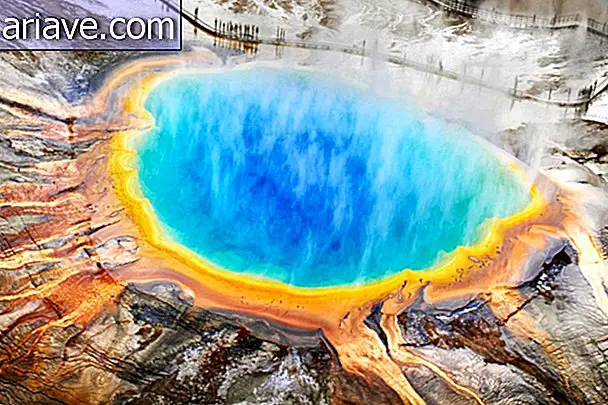Mystery: Bangs without apparent cause scare the world

Suddenly a loud crash breaks the calm of the day. At first it sounds like thunder, but the sky is clear and blue like never before. This is a reasonably common scene in North Carolina, United States, and it could just be an everyday and unimportant fact, were it not for the presence of many similar reports from different parts of the world.
According to the article “What's that sound?”, Published in the New Scientist magazine of February 18, 2012, for centuries this type of phenomenon has been witnessed by humans. In the Lake Seneca region of the United States, the mysterious event is named Seneca guns ; in the Apennine mountain range in Italy, the noises are known as brontidi ; and in Japan they got the nickname yan . Belgium has opted for a curious expression: mistpouffers, which in good Portuguese means “belching fog”.
Much of the natural noise we hear has a plausible explanation, such as storms or the breaking of waves in the sea. However, these answers seem insufficient to explain the roars heard in North Carolina and elsewhere. Another possible explanation would be the action of the human being on Earth, but the phenomenon also occurs in distant places and far from large centers.
Too many theories, less certainty
There are several ideas about the cause of these amazing noises. The first explanation that comes to mind for many people is thunder, that is, rapid expansions of air caused by increased heat and pressure from lightning. However, North Carolina has a calm climate and storms are rare.
In addition, as reported by the magazine, University of Hawaii acoustics expert Milton Garces states that the ocean can also make very curious noises through the impact of a wave on the surface or through compressed air that can be expelled from inside her. However, this type of event is also perceived offshore.

There are also those who believe that these crashes are caused by meteors that survive entry into the earth's atmosphere. Since they are falling at a very high speed, they are likely to produce a sonic explosion and the trail left by them has already disappeared when the noise reaches the ears of local citizens. But in an interview with New Scientist, geophysicist Michael Hedlin states that such an event would be rare and therefore not consistent with the explosions heard over a period of months or years.
Another possibility is the release and explosion of large quantities of methane from the seabed. However, it is very unlikely that this gas will be released at the optimal speed and quantity to make it happen. Some also blame the presence of military bases in the region, but the noise is also heard from a distance far away.
Eliminating all these suspects, there is still one possible culprit behind this mystery: undetected earthquakes.
When the earth decides to “speak”

According to New Scientist, the North Carolina region has a very poor network of seismographs, so many small earthquakes may go unnoticed. David Hill, an emeritus scientist at the Unites States Geological Survey (USGS), believes that large earthquakes are not required to make a huge noise heard.
Minor earthquakes happen all the time, even far from the boundaries of plate tectonics, and although they are almost undetectable by seismographs, together these earthquakes could cause a crash capable of resonating outward. However, it is not easy to confirm exactly that this is the cause of North Carolina's "thunder".
Anyone who has experienced an earthquake knows how noisy the situation can be. After all, when the earth's crust trembles, everything on it also rocks: cars, buildings, houses, shelves, tables, etc. Thus, it is difficult to know the sound of an earthquake without constructions and objects interfering with it.
One person who has come too close to knowing what an earthquake sounds like is one of Hill's colleagues, Malcolm Johnston. In 2008, while at a depth of 3.6 km at a South African gold mine, Johnston witnessed a magnitude 2 earthquake that originated 20 meters away from him. At once he heard a sound that sounded like a sequence of thunder but also had overlapping high frequency noises.
On the surface, the sensation is different, as only very low frequency waves reach us, and normally they are not perceived by the human ear. Audible waves of shorter lengths, from 20 hertz to 20 kilohertz, end up being absorbed and dispersed by the stones crossed along the way.
Climate and soil also influence
Hill believes that earthquake noise can be heard on the surface under certain conditions. A not very deep earthquake, for example, can increase the chances that the noise will reach people's ears. In addition, the constitution of the soil contributes to barring the crash or not: rocks such as granite, for example, do not disperse sound waves as much.
Should the noise find a crack, it will reach the surface even more easily as it can travel without obstacles. As if that were not enough, the weather also influences the wave propagation. A layer of warm air in the atmosphere, for example, can make the sound reach even longer distances.
Even so, some doubt that possibility. Jonathan Lees, a geophysicist at the University of North Carolina, says the instruments used to detect earthquakes are too sensitive and he believes these noises are caused by another kind of natural phenomenon.
Whatever the cause of these mysterious crashes, we have often attributed to human activity a phenomenon that may be caused by the planet itself. Let's hope this whole noise is not a cry for help from Earth.











